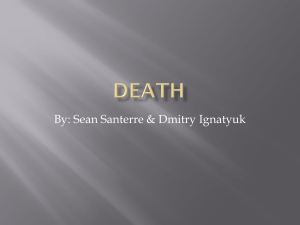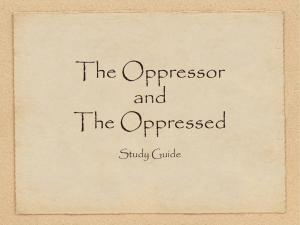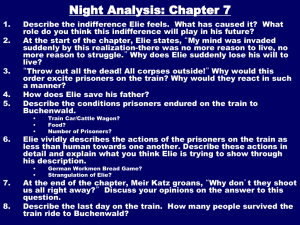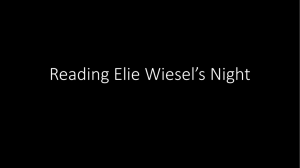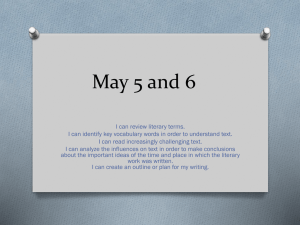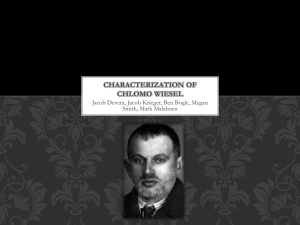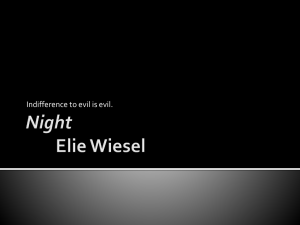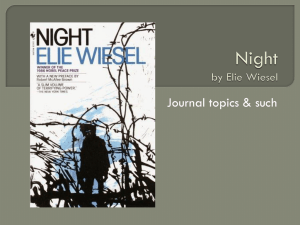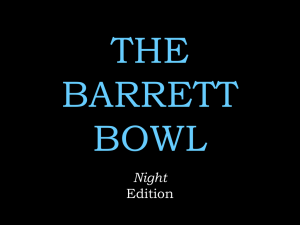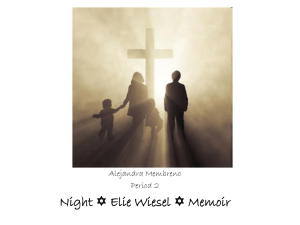Ms.Karvonen Language 10 “The Night” study questions MULTIPLE
advertisement
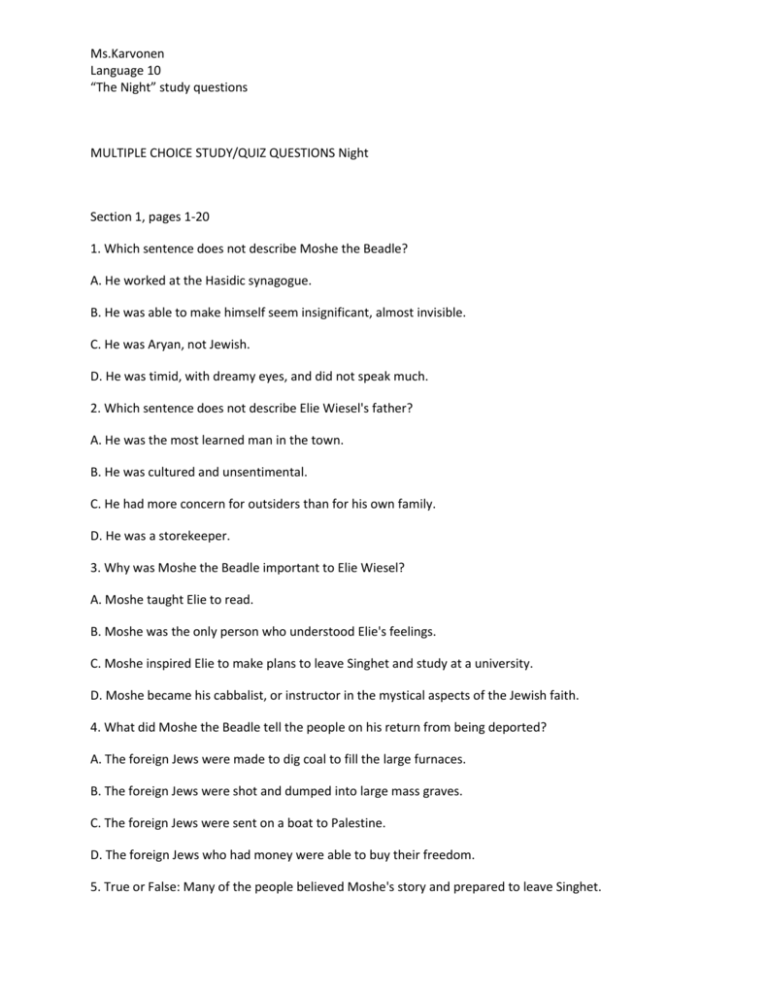
Ms.Karvonen Language 10 “The Night” study questions MULTIPLE CHOICE STUDY/QUIZ QUESTIONS Night Section 1, pages 1-20 1. Which sentence does not describe Moshe the Beadle? A. He worked at the Hasidic synagogue. B. He was able to make himself seem insignificant, almost invisible. C. He was Aryan, not Jewish. D. He was timid, with dreamy eyes, and did not speak much. 2. Which sentence does not describe Elie Wiesel's father? A. He was the most learned man in the town. B. He was cultured and unsentimental. C. He had more concern for outsiders than for his own family. D. He was a storekeeper. 3. Why was Moshe the Beadle important to Elie Wiesel? A. Moshe taught Elie to read. B. Moshe was the only person who understood Elie's feelings. C. Moshe inspired Elie to make plans to leave Singhet and study at a university. D. Moshe became his cabbalist, or instructor in the mystical aspects of the Jewish faith. 4. What did Moshe the Beadle tell the people on his return from being deported? A. The foreign Jews were made to dig coal to fill the large furnaces. B. The foreign Jews were shot and dumped into large mass graves. C. The foreign Jews were sent on a boat to Palestine. D. The foreign Jews who had money were able to buy their freedom. 5. True or False: Many of the people believed Moshe's story and prepared to leave Singhet. Ms.Karvonen Language 10 “The Night” study questions A. True B. False 6. What was the setting and the year for the first section of the book? A. 1935-1939 in Prague, Czechoslovakia B. 1950-1952 in Palestine and Jerusalem C. 1910-1915 in Berlin, Germany D. 1942-1944 in Sighet, Transylvania22 7. List, in order, the events that happened from the last day of Passover until Pentecost. A. Two ghettos were set up. B. The Jews had to start wearing the yellow star. C. The Germans arrested the Jewish community leaders. D. The Jewish residents were not allowed to leave their houses for three days. 8. Elie Wiesel said he began to hate them because they were his and his community's first oppressors. Who were they? A. the Gestapo officers B. the Hungarian police C. the members of the Jewish council D. their non-Jewish neighbors 9. True or False: Elie's mother and sisters went to Martha's village. A. True B. False23 Sections 2, 3, pages 21-43 1. To what did Wiesel compare the world? A. He compared it to a blind and deaf person. B. He compared it to a large hole in the ground. Ms.Karvonen Language 10 “The Night” study questions C. He compared it to a cattle wagon hermetically sealed. D. He compared it to the Bible story of the Jews in slavery in Egypt. 2. What did Madame Schächter see in her vision? A. She saw large open graves full of children. B. She saw a fire--a furnace, with huge flames. C. She saw row after row of empty houses. D. She saw the face of Hitler laughing at the entire world. 3. True or False: Some of the young men tied Madame Schächter up and gagged her. Then they hit her. A. True B. False 4. What did the Jews in the train car discover when they looked out the window? A. They saw several large factories surrounded by barbed wire fences. B. They saw lines of soldiers with truncheons, ready to beat them as they got off. C. They saw flames gushing out of a tall chimney into the sky. D. They saw wagons full of dead bodies. 5. What did Wiesel say about the travelers' illusions? A. They left their illusions in the ghetto in Sighet. B. They were still clinging to their illusions even though they gave up their possessions. C. They left their cherished objects and illusions behind on the train. D. Seeing the German soldiers made them give up their illusions. 6. Which notorious SS officer did they meet at the concentration camp? A. They met Hitler himself. B. They met Eichman. C. They met General Kolomaye. Ms.Karvonen Language 10 “The Night” study questions D. They met Dr. Mengele.24 7. What was Elie's main thought as the men and women were being herded from the train? A. It was to stay with his father at all costs. B. It was to keep his faith in God. C. It was to stay alive and healthy. D. It was to be as brave as possible. 8. True or False: The people were reciting the Kaddish, the prayer for the dead, for themselves. A. True B. False 9. True or False: Elie beat up the gypsy who struck his father. A. True B. False 10. Which statement is true? A. They went to Birkenau, then to Bergen-Belsen, then to Auschwitz. B. They stayed at Nuremberg for one month. C. They stayed at Galicia for six days, then went to Birkenau. D. They were at Auschwitz for about three weeks. Then they went to Buna. 25 Section 4, pages 45-62 1. True or False: The dentist gave Elie a gold crown for one of his rotten teeth. A. True B. False 2. What did Elie Wiesel do when Idek hit his father? A. Elie did not do anything to help his father. B. He hit Idek over the head with a chair. C. He prayed out loud for forgiveness for Idek. Ms.Karvonen Language 10 “The Night” study questions D. He hit his father himself for not avoiding Idek's punishment. 3. What did Franek want from Elie? A. He wanted Elie's new shoes. B. He wanted the money Elie was hiding in the hem of his pants. C. He wanted Elie's gold tooth. D. He wanted Elie's blanket. 4. True or False: Elie gave up the item to keep Franek from tormenting his father. A. True B. False 5. What were the only things in which Elie took an interest? A. He only took an interest in sleep and prayer. B. He only took an interest in his and his father's health. C. He only took an interest in counting the days until he could get out. D. He only took an interest in his soup and his crust of stale bread. 6. True or False: Elie said the men were more depressed than ever after the air raid. A. True B. False 7. What happened to the young man from Warsaw? A. He was tortured and hanged for hitting an SS officer. B. He was electrocuted when he tried to climb over the fence. C. He was hanged for stealing during the air-raid. D. He was shot while trying to escape. 26 8. How did Elie say the soup tasted the night the pipel (young servant boy) was hanged? A. He said it tasted delicious. B. He said he did not even taste it. Ms.Karvonen Language 10 “The Night” study questions C. He said it tasted of corpses. D. He said it tasted like blood. 27 Section 5, pages 63-80 1. When did the men hold their prayer service and wish each other a Happy New Year? A. on the eve of Rosh Hashana B. on the first day of Hanukkah C. on Yom Kippur D. on December 31 2. True or False: Elie said he observed the prayer service like a stranger. A. True B. False 3. What was Elie's decision about fasting on Yom Kippur? Why did he make that decision? A. He fasted because it was the right thing to do. B. He did not fast, partly as an act of rebellion against God. 4. What was Elie's inheritance from his father? A. The inheritance was a few diamonds Mr. Wiesel had hidden in the heel of his shoe. B. The inheritance was a gold watch and chain. C. The inheritance was a knife and spoon. D. The inheritance was a long underwear and a pair of socks. 5. Why was his father giving it to him? A. Mr. Wiesel had been selected. He was giving it to his son before his death. B. Mr. Wiesel thought Elie might be able to buy his freedom. C. Mr. Wiesel wanted Elie to be comfortable. D. Mr. Wiesel thought Elie had a better chance of hiding the things than he did. Ms.Karvonen Language 10 “The Night” study questions 6. Did the men remember to say the Kaddish for Akiba Drumer? A. Yes, they did. B. No, they did not. 7. What did Elie dream of when he dreamed of a better world? A. He imagined a world without German soldiers. B. He imagined a soup pot that was always full. C. He imagined all people living in peace. D. He imagined a world with no bells. 28 8. What happened to the patients who stayed in the hospital instead of being evacuated? A. The local townspeople took care of them until the end of the war. B. They all died of starvation. C. They were liberated by the Russians two days after the others left. D. They were murdered by the Germans before they left. 9. What was the last thing the head of the block ordered the men to do before they evacuated? A. He ordered them to burn all of the buildings. B. He ordered them to shred all of the records about the camp. C. He ordered them to eat all of the remaining food. D. He ordered them to clean the block. 10. What was the weather like during the evacuation? A. It rained the entire time. B. It snowed the entire time. C. It was clear but below zero. D. There was a hail storm. 29 Sections 6, 7, 8, 9, pages 81-109 1. While running, an idea began to fascinate Elie. What was the idea? Ms.Karvonen Language 10 “The Night” study questions A. It was death. B. It was escape. C. It was murdering the soldiers. D. It was finding his mother 2. What did Elie realize about Rabbi Eliahou's son just after the evacuation? A. The son was dead and the Rabbi could not admit it. B. The son had been trying to lose his father as the men were all running. C. The son had escaped and did not take his father. D. The son betrayed his father to get extra bread for himself. 3. True or False: Juliek played a Mozart concerto for the men in the camp. A. True B. False 4. True or False: They were at Gleiwitz for three days. Then they traveled by train for ten days until they reached Buchenwald. A. True B. False 5. Who died in the train just before the men were unloaded? A. Juliek B. Meir Katz C. Ezra Malik D. Tzipora 6. How many men started out in the train? How many were left when they arrived at Buchenwald? A. Ten thousand men started out. Five hundred were left. B. Three hundred started out. Fifty were left. Ms.Karvonen Language 10 “The Night” study questions C. Four thousand started out. Two thousand were left. D. One hundred men started out. About twelve were left. 7. What happened to Mr. Wiesel, Elie's father? A. He survived. B. He died. 30 8. What was Elie's only desire? A. He wanted to eat. B. He wanted to sleep. C. He wanted to find out if his mother and sisters were alive. D. He wanted to take a bath. 9. When did the first American troops arrive at the camp? A. 3 AM, May 5, 1946 B. Midnight, June 1, 1945 C. 6 PM, April 10, 1945 D. 10 AM, March 30, 194731
